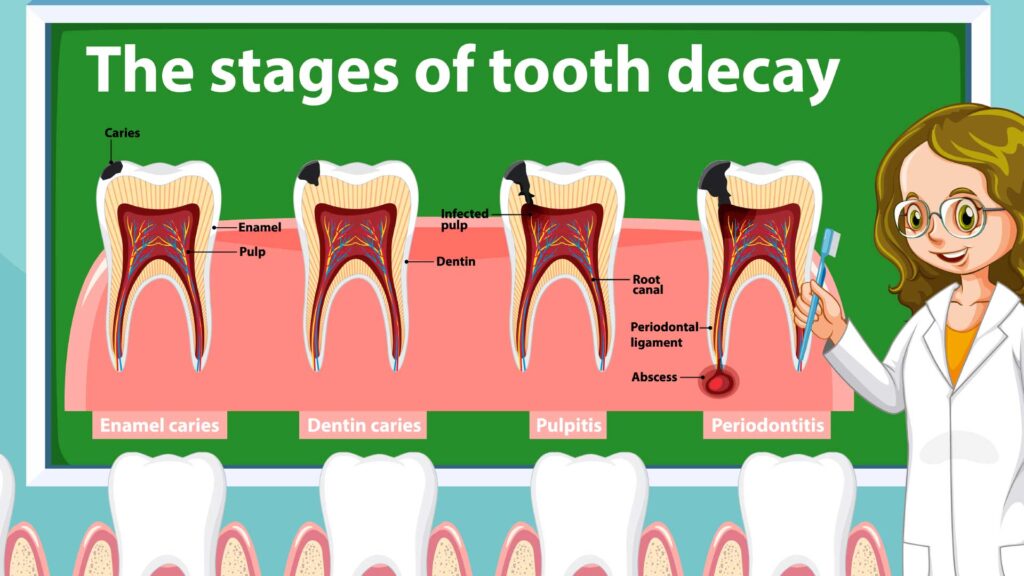Tooth decay, commonly referred to as dental caries or cavities, is a widespread oral health concern that can impact individuals of all ages. It occurs when the hard surfaces of teeth are damaged by acid-producing bacteria, leading to the breakdown of enamel and, if untreated, deeper layers of the tooth. This article explores the causes, symptoms, prevention, and treatment of tooth decay.
Causes of Tooth Decay
Tooth decay is mostly caused by the interaction of snacks, bacteria, and saliva in the mouth. Many factors contribute to the formation of cavities:
1. Bacterial Activity: The human mouth harbors numerous bacteria, particularly Streptococcus mutans and Lactobacilli, which thrive on sugars and starches. These bacteria produce acid as a byproduct of metabolizing carbohydrates, which erodes tooth enamel over time.
2. Diet: Frequent consumption of sugary and acidic foods and beverages increases the risk of tooth decay. Sticky foods, like candies and dried fruits, pose a significant risk as they tend to cling to the teeth.
3. Poor Oral Hygiene: Lack of brushing and flossing allow plaque to accumulate, which is a stifling and sticky film of bacteria and food particles. Over the time, plaque hardens into tartar, further promoting tooth decay.
4. Dry Mouth: Saliva plays a important role in washing away food particles and neutralizing acids. A dry mouth caused by dehydration, medications, or some medical conditions, can accelerate the tooth decay.
5. Genetic Factors: Some individuals may inherit softer enamel or other genetic predispositions that make them more susceptible to cavities.
Symptoms of Tooth Decay
Tooth decay progresses in stages, with symptoms varying depending on the severity:
1. Early Stage: White or brown spots may appear on the enamel. At the initial stage, there is typically no noticeable pain.
2. Moderate Stage: As decay penetrates the enamel and reaches the dentin, sensitivity to hot, cold, and sweet foods may develop.
3. Advanced Stage: Severe decay can reach the tooth pulp, causing intense pain, infection, and the formation of abscesses.
4. Visible Damage: Cavities may additionally show up as holes or pits on the floor of the teeth
Prevention of Tooth Decay
Preventing tooth decay requires a proactive approach to oral hygiene and dietary habits:
1. Regular Brushing and Flossing: Brush teeth at least twice a day using fluoride toothpaste and floss daily to remove plaque from between the teeth.
2. Dietary Changes: Reduce the intake of sugary and acidic foods. Incorporate tooth-friendly foods such as fresh fruits, vegetables, cheese, and nuts.
3. Fluoride Application: Fluoride enhances the strength of tooth enamel and helps protect against acid damage. Brushing with fluoride toothpaste and considering professional fluoride treatments, as advised by your dentist, can be beneficial.
4. Routine Dental Checkups: Visit the dentist every six months for cleanings and early detection of potential issues.
5. Sealants: Dental sealants are a protective coating applied to the chewing surfaces of molars to prevent food particles from lodging in grooves.
6. Hydration: Drink plenty of water to promote saliva production and rinse away food particles.
Treatment of Tooth Decay
1. Fluoride Treatments: In the early stages, professional fluoride applications can help remineralize enamel and reverse decay.
2. Fillings: For cavities that have progressed beyond the enamel, dentists remove the decayed portion and fill the cavity with materials such as composite resin, amalgam, or gold.
3. Crowns: Severely decayed teeth may require a crown to restore their shape, size, and function.
4. Root Canal Therapy: If the tooth decay reaches the tooth pulp, a root canal is imperative to remove and clean the infected area and tissue to save the tooth.
5. Tooth Extraction: In severe cases where a tooth is beyond repair, extraction becomes necessary.
The Impact of Untreated Tooth Decay
Ignoring tooth decay can lead to severe oral health issues and potentially serious complications and lead to significant oral and systemic health problems. Advanced tooth decay may cause severe toothache, infections and tooth loss. If it’s left untreated, cavities can lead to serious infections that may spread to sinus other areas of the body, potentially resulting in serious health complications.
Conclusion
Tooth decay is a preventable condition that requires consistent oral hygiene, healthy dietary habits, and regular dental care. Early detection and treatment are essential to preserving dental health and preventing complications. By understanding the causes and taking proactive steps, individuals can maintain healthy teeth and a confident smile for life.
If you have any questions or need more information about your options, don’t hesitate to reach out to Gentle Dental Care on (703) – 495 – 9992 or you can also request an appointment by clicking on the book appointment button below. They can help guide you through the decision-making process and ensure you receive the best possible care for your oral health.


